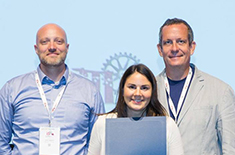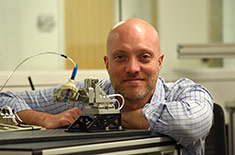Congratulations to University of Utah mechanical engineering associate professor Kam Leang, who has been elected a Fellow of The American Society of Mechanical Engineers. Read more… ...
Read MoreProf. John Hollerbach receives the 2020 IEEE RAS George Saridis Leadership Award in Robotics and Automation
Congratulations to Prof. John Hollerbach! He received the 2020 IEEE RAS George Saridis Leadership Award in Robotics and Automation from the IEEE Robotics and Automation Society (RAS). The award will be presented to him at the 2020 IEEE ICRA conference in Paris. For your information, past recipients of this prestigious award are listed at: https://www.ieee-ras.org/awards-recognition/society-awards/69-awards-recognition/society-awards/56-ieee-ras-george-saridis-leadership-award-in-robotics-and-automation ...
Read MoreDr. Daniel Drew will join University of Utah Robotics Center
Daniel Drew will be joining the Robotics Center and the Department of Electrical and Computer Engineering from a postdoctoral research position in Mechanical Engineering at Stanford University. He received his Ph.D. in Electrical Engineering from UC Berkeley in 2018. His research focuses on the development of autonomous insect-scale systems, bridging the worlds of robotics, MEMS, and design. His past work includes development of a flying millimeter-scale robot with no mechanical moving parts (the “ionocraft”), investigating new methods for resource-constrained communication and control, and studying how humans interact with swarms of insect-scale robots. Website link: http://www.danieldrew.me...
Read MoreDr. Alan Kuntz joins University of Utah Robotics Center
Alan Kuntz will be joining the Robotics Center and the School of Computing from a postdoctoral research position in mechanical engineering at Vanderbilt University. He earned his PhD from the University of North Carolina at Chapel Hill in computer science. His research interests include shared autonomy, motion planning, and design optimization for manipulators and tentacle-like, flexible robots with an emphasis on home assistance and surgical applications. His interest in health care applications stems from his previous experience as a paramedic in the 911 system of Albuquerque, NM....
Read MoreAbbott, Kong, Leang and Monson receive $2M NSF EFRI Award
Congratulations to Profs. Abbott, Kong, Leang and Monson on their new $2M NSF EFRI Award, project in collaboration with R. Rajamani of Univ. of Minnesota and O. Pak of Santa Clara Univ. Project tile: “EFRI C3 SoRo: Magneto-electroactive Soft, Continuum, Compliant, Configurable (MESo-C3) Robots for Medical Applications Across Scales” The vision of this collaborative project between the University of Utah, the University of Minnesota, and Santa Clara University is to extend the capabilities of clinicians by enabling minimally invasive access to locations in the human body that are currently difficult or impossible to reach, using a new class of...
Read MoreProf. Jake Abbott’s work on magnetic capsule endoscope featured in PCMag.com
Prof. Jake Abbott’s work on magnetic capsule endoscope featured in an article in PCMag.com: https://www.pcmag.com/news/363730/this-robot-might-make-invasive-colonoscopies-a-thing-of-the ...
Read MoreHermans’ and Abbott’s ISRR 2017 papers accepted
Two papers by robotics faculty were recently accepted to the International Symposium on Robotics Research (ISRR): “Planning Multi-Fingered Grasps as Probabilistic Inference in a Learned Deep Network” by Qingkai Lu, Kautilya Chenna, Balakumar Sundaralingam, and Tucker Hermans. “Controlling Homogeneous Microrobot Swarms In Vivo Using Rotating Magnetic Dipole Fields”, by Jake J. Abbott and Henry C. Fu ...
Read MorePopek, Hermans, and Abbott Win Best Paper Award in Medical Robotics at ICRA 2017
Katie Popek, Tucker Hermans, and Jake Abbott’s paper entitled, “First Demonstration of Simultaneous Localization and Propulsion of a Magnetic Capsule in a Lumen Using a Single Rotating Magnet,” was recently awarded the Best Paper Award in Medical Robotics at the 2017 IEEE International Conference on Robotics and Automation (ICRA) in Singapore. ICRA is the largest annual international robotics conference, and is the flagship conference of the IEEE Robotics and Automation Society. Abbott is an associate professor in the Department of Mechanical Engineering, Hermans is an assistant professor in the School of Computing, and Popek recently earned her Ph.D. in Computing (Robotics Track) while conducting research...
Read MorePopek, Hermans and Abbott ICRA 2017 paper selected as one of the finalists of Best Medical Robotics Paper Award
Katie Popek, Tucker Hermans and Jake Abbott’s submitted paper entitled: “First Demonstration of Simultaneous Localization and Propulsion of a Magnetic Capsule in a Lumen Using a Single Rotating Magnet” has been selected as one of the finalists of Best Medical Robotics Paper Award of ICRA 2017. Congratulations to Katie, Tucker and Jake!...
Read MoreJake Abbott’s group publishes in IEEE Transactions on Human-Machine Systems and IEEE Robotics and Automation Letters
Jake Abbott’s group publishes two new research papers, one on how humans interact with robots designed for precision tasks such as microsurgery and another on localizing magnetic capsule endoscopes inside the human body. In their new paper “Human Velocity Control of Admittance-Type Robotic Devices With Scaled Visual Feedback of Device Motion,” published in the IEEE Transactions on Human-Machine Systems, Dr. Abbott’s group describes the control of a class of robots uses for very precise tasks. These robots are heavily geared, so that they only move in a very controlled way, and the human operator interacts directly with a force sensor...
Read More




